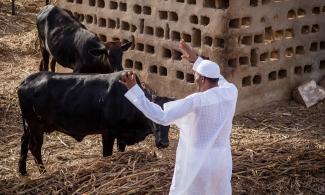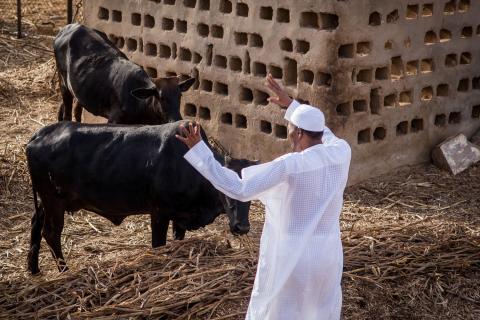
This week President Muhammadu Buhari (PMB), has finally undertaken the much-anticipated state visit to the United States of America. There is no gainsaying the fact that the state visit is one of the most important events for the six-week old administration and to underscore its significance, PMB even penned an Op-Ed article for the WASHINGTON POST newspaper.

That article offers a peek into the Sphinx-like, inscrutable mind of our president. From the beginning of the administration, it was clear that the vow to destroy the Boko Haram insurgency would be central to both the security and foreign policy planks of the government. That explained why Buhari paid early visits to our near neigbours, Niger and Chad as well as hosted a summit that firmed up resolve at a sub-regional level, against an insurgency that is not only killing, maiming and disrupting livelihood in Nigeria, Niger, Chad and Cameroun, but has consciously chosen to become an affiliate of international terror.
It was therefore no surprise that PMB’s article would open up on the Boko Haram terror group and the heightening of its bombings of soft targets over the past few weeks all over Northern Nigeria. Buhari told his American readers that the world had actually “moved a step closer to the defeat of Boko Haram”. If his readers raised an eyebrow at such a definitive declaration, PMB justified his positive assertion by adding that we “are beginning to see a degrading of Boko Haram’s capabilities as a fighting force”. The spates of attacks that we are witnessing in the bombings of markets, motor parks, places of worship or even assemblies of workers are indicative of the changing reality on the ground: Boko Haram “appears to have shifted away from confronting the military directly to an increase in attacks on civilian areas”. The use of an elderly woman and even a 10-year old girl in suicide bombings, in the context of Buhari’s analysis, are desperate acts claiming innocent lives, but they are not indicative of strength. On the contrary, “It shows that it (Boko Haram) is losing”.
This positive message is one of the platforms he took to Washington and the context could not be any more favourable. The previous government in Nigeria had a very difficult relationship with the Obama Administration, with the Nigerian Ambassador in Washington expressing frustration that the United States was refusing to sell Nigeria vital equipment needed to fight the insurgency. On its part, the United States was concerned about the deep corruption that pervaded the anti-insurgency operations under the Jonathan administration. America argued that even bullets were not reaching frontline forces in some instances while it was not sure that our forces at the time could even properly use attack helicopters that the administration was seeking to purchase. Buhari was upbeat, explaining that six weeks into his administration, “I have replaced the heads of Nigeria’s army, navy and airforce”. And more significantly: “Our new military leadership has not been chosen because of their familiarity with those in government, as was often the case in the past, but on their track records and qualifications alone”. This new development compliments the decision to shift command and control to the theater of operations in the Northeast of the country, which will also bring the military leadership closer to the joint operational activities with the neighbouring countries, the earliest plank of the security apparatus that Muhammadu Buhari worked out, soon after his inauguration. In terms of a concrete demand, PMB was unambiguous: “We seek the support and partnership of the United States in…the fight against terrorism…Our allies can provide much-needed military training and intelligence as our soldiers take the war effort to Boko Haram”.
The transition to a new government in Nigeria came about because the Nigerian people wanted change after 16 years of PDP rule, which in the last four years under President Goodluck Jonathan especially, degenerated into probably the worst period in our national history. The administration seemed determined to run Nigeria into the precipice, exploiting the fault lines of the country in a desperate desire to remain in power by all means and exhibiting an incompetence that frightened Nigerians and foreigners alike. The external component of the change process was the close manner that the United States and Britain particularly, monitored developments in the lead to the elections and the closer manner that Nigerians and these countries also policed the outcome of the voting process. Buhari was aware of that fact, and his Op-Ed piece described his meeting with President Obama appropriately as “the first time a president of the United States will encounter a Nigerian counterpart following the peaceful transfer of power in a contested election in our history”. He is the beneficiary of that process and by Monday afternoon, he got a ringing endorsement from President Obama, who reminded that “President Buhari came into office with reputation for integrity and a very clear agenda..”
Buhari himself had emphasized to his American readers his “determination…(at) instilling good governance and tackling the scourge of corruption that has held Nigeria back for too long”. He went further that he was going to seek Obama’s assistance in locating and returning $150 billion in funds “stolen in the past decade and held in foreign bank accounts on behalf of former, corrupt officials”. He then vowed that such a manner of conducting Nigerian affairs cannot be allowed to continue. In a broad historical sweep, Buhari argued that: “there are too few examples in the history of Nigeria since independence where it can be said that good management and governance were instituted at the national level. This lack of a governance framework has allowed many of those in charge, devoid of any real checks and balances, to plunder”. That failure of governance was also a factor in the inability to defeat Boko Haram along with the conduct of the military campaign. Buhari used the article to allow a peek into his plan to set the country on a path of restitution: “So the path we must take is simple, even if it is not easy: First, instill rules and good governance; second, install officials who are experienced and capable of managing state agencies and ministries; and third, seek to recover funds stolen under previous regimes so that this money can be invested in Nigeria for the benefit of all our citizens”.
This perspective flows into one of the most-talked about issues in Nigeria today, and that is the slow pace of events, at a time when people had been primed for rapid changes and the appointment of a new cabinet. Already, PMB is being described as “BABA GO-SLOW” in many quarters. Buhari confronted that issue frontally: “I was elected on a platform of change”, he reminded. “I know this is what the people of Nigeria desire more than anything else. I know they are impatient for action. I realize the world waits to see evidence that my administration will be different from all those that came before”. Having reminded that he was aware that he was a president that much is expected from, especially by the mass of the young people who warmed up to him as a candidate of change, he then cautioned: “…reforming (Nigeria) after so many years of abuse cannot be achieved overnight”. For the politicians in search of cabinet appointments, they still have two more months to wait: “cabinet ministers (will be) appointed in September…some months after I took oath of office”. Why would the nation wait for that long? Buhari said “it would neither be prudent nor serve the interest of sound government to have made these appointments immediately…instead, Nigeria must first put new rules of conduct and good governance in place…to ensure that this process is carried out correctly”.
I think that the Op-Ed piece affirmed basic platforms of the Buhari agenda: the fight against Boko Haram and the anti-corruption fight, especially the loot recovery effort; to return a whopping sum of $150Billion that was stolen by officials of government in ten years alone! He added that: “…we look to U.S. businesses as well as the Obama administration to help develop governance initiatives that can ensure that Nigeria’s wealth benefits all of its people, not just a few. By taking these steps, we will be positioned to benefit from increased investment- particularly in energy and electricity- from the United States”. By the second day of the four-day visit, the World Bank was pledging the sum of $2billion to assist in the re-development of the insurgency-ravaged Northeastern part of Nigeria. And that will certainly represent a major take away from the state visit to the United States. But there is also a point of worry in all these points, and one that represents a problem that Muhammadu Buhari has to correct as fast as possible. Why did he have to announce to American readers that he was not going to have a cabinet in place until September? Why did he refuse to tell the Nigerian people who actually voted him to power and who were impatient for action, as he also acknowledged? Why must the charity of our leaders begin abroad? It insults our patriotism to have to discover such an important decision in the Op-Ed page of an American newspaper!
Muhammadu Buhari came to power on the crest of tremendous popular support and enthusiasm; I have supported him since 2003, and I have no doubts in my mind that he will provide the leadership for the change that will put Nigeria on a path of sanity and a gradual restitution away from the institutional kleptocracy of the past sixteen years. But he has to communicate better with the Nigerian people. In a democracy, the government and especially the president, must not only be seen to be working for the people, he must earn the people’s trust on an on-going and permanent manner, through a regular dialogue and respect for desires that can often be impatiently held and expressed. In Nigeria today, the majority of our people are young, with 75% of the population under the age of thirty-five. They were the most mobilized segment of the population that bought into the agenda for change that Buhari represented. They are also the internet and social media generation, that should not be taken for granted and must be kept on board the chariot of change. The visit to the United States looks like ending up as successful and a major endorsement for Buhari. But he has to work harder in the way that he communicates his activities, decisions and plans to the Nigerian people, because in the long run, that is the endorsement which matters most!